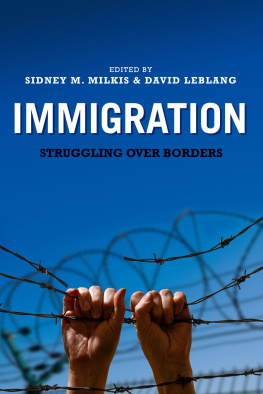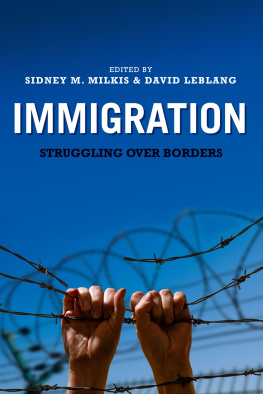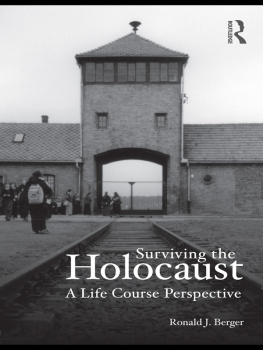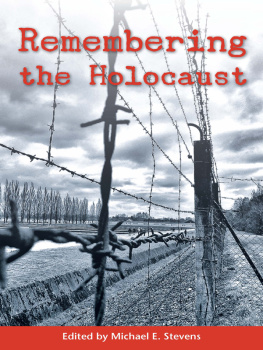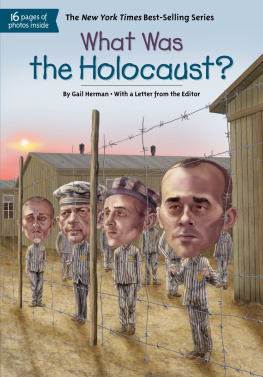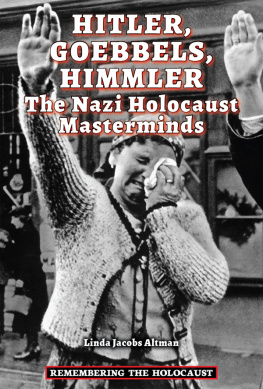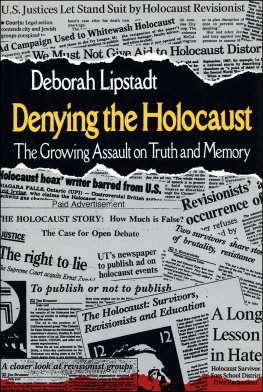Sidney M. Milkis - Immigration
Here you can read online Sidney M. Milkis - Immigration full text of the book (entire story) in english for free. Download pdf and epub, get meaning, cover and reviews about this ebook. publisher: University of Virginia Press, genre: Politics. Description of the work, (preface) as well as reviews are available. Best literature library LitArk.com created for fans of good reading and offers a wide selection of genres:
Romance novel
Science fiction
Adventure
Detective
Science
History
Home and family
Prose
Art
Politics
Computer
Non-fiction
Religion
Business
Children
Humor
Choose a favorite category and find really read worthwhile books. Enjoy immersion in the world of imagination, feel the emotions of the characters or learn something new for yourself, make an fascinating discovery.
- Book:Immigration
- Author:
- Publisher:University of Virginia Press
- Genre:
- Rating:4 / 5
- Favourites:Add to favourites
- Your mark:
- 80
- 1
- 2
- 3
- 4
- 5
Immigration: summary, description and annotation
We offer to read an annotation, description, summary or preface (depends on what the author of the book "Immigration" wrote himself). If you haven't found the necessary information about the book — write in the comments, we will try to find it.
Immigration — read online for free the complete book (whole text) full work
Below is the text of the book, divided by pages. System saving the place of the last page read, allows you to conveniently read the book "Immigration" online for free, without having to search again every time where you left off. Put a bookmark, and you can go to the page where you finished reading at any time.
Font size:
Interval:
Bookmark:
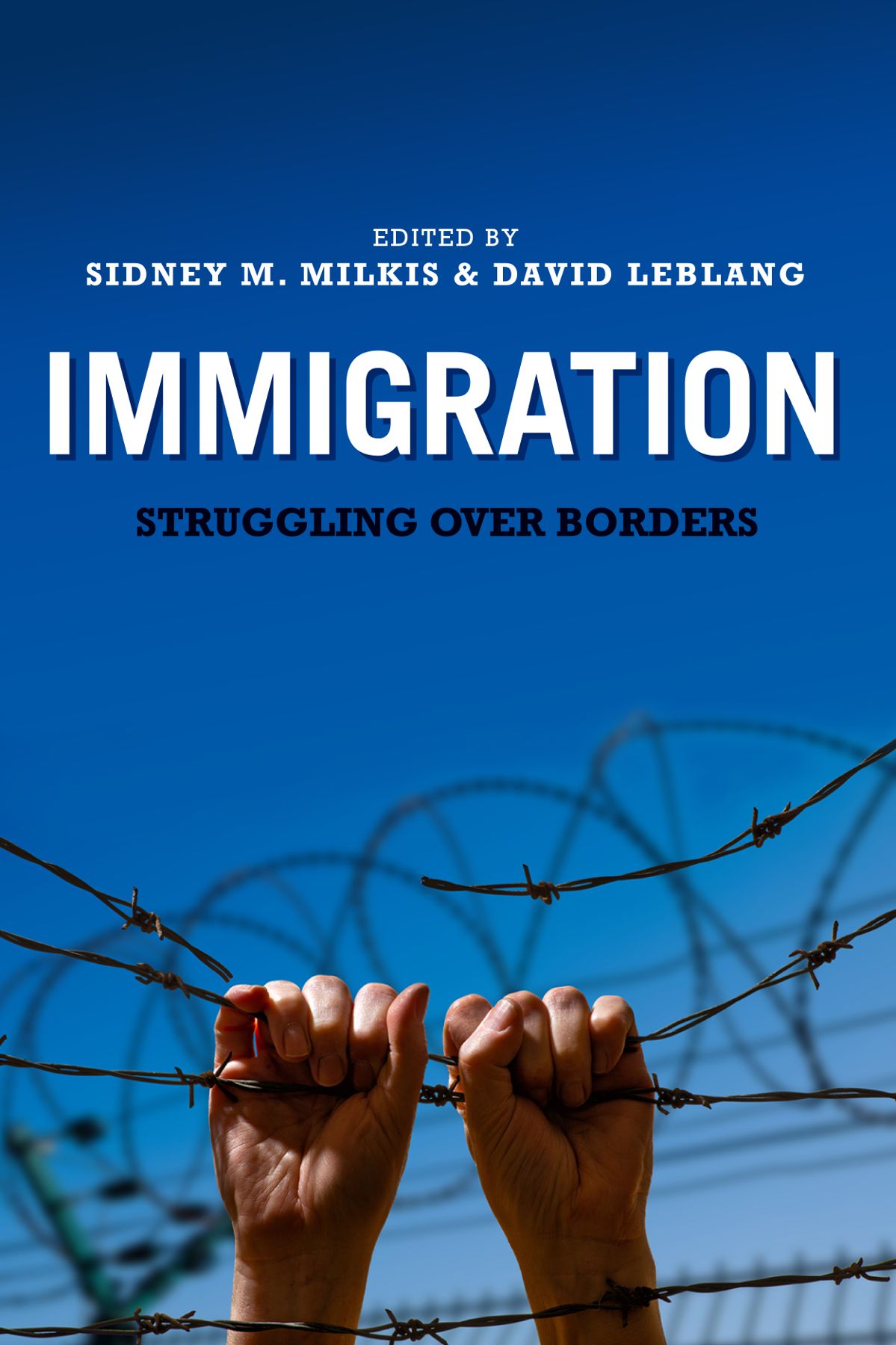
MILLER CENTER STUDIES ON THE PRESIDENCY
MARC J. SELVERSTONE, EDITOR
Miller Center Studies on the Presidency is a series of original works that draw on the Miller Centers scholarly programs to shed light on the American presidency past and present.
THE FIRST YEAR PROJECT
Edited by Sidney M. Milkis and David Leblang
University of Virginia Press
Charlottesville and London
David A. Martin
Gary Freeman
Anna O. Law
Daniel J. Tichenor
These essays were written in the spring of 2016, before anyone knew that Donald Trump and his controversial positions on immigration would ascend to the White House. As such, they provide a useful baseline to consider the tumultuous first year of the Trump presidency. One thing was clear during the protracted and bitter presidential campaign: whoever moved into the White House in 2017 would face enormous pressure to take decisive action on how immigration admissions and rights were governed. Anticipating the highly polarized politics of immigration that have roiled the nation during the past year, the experts who contributed essays to this First Year 2017 volume on immigration differed substantially in their prescriptions.
This election marked the first time in fifty years that Americans ranked immigration among their top concerns, observed Gary Freeman of the University of Texas at Austin. Although the presumptive Republican nominee, Donald Trump, was largely responsible for this salience, his calls for the building of a massive wall on the Mexican border and the banning of Muslims from the United States tapped into demographic and political conditions that historically have made immigration a fraught issue: a surge in Americas foreign population, economic dislocation, and clear party differences over how to respond to these major changes.
Meanwhile, the historical lessons drawn from the essays of Anna O. Law of Brooklyn College and Daniel J. Tichenor of the University of Oregon reveal that the two most important immigration laws enacted during presidential first years represent the polarized positions in the ongoing struggle over how welcoming our nation should be to the foreign-born who seek our shores.
The 1882 Chinese Exclusion Act, passed during the first year of Chester A. Arthurs presidency (he replaced the slain James A. Garfield in September 1881), was the first national immigration law to prohibit a specific ethnic group from migrating to the United States. It established a nativist precedent the led over the next half century to the enactment of several restrictive immigration laws, culminating in the 1924 legislation that imposed national origin quotas, which slowed immigration from southern and eastern Europe to a trickle and barred nearly all Asians from coming to America.
By contrast, the 1965 Immigration and Nationality Act (INA), pushed through Congress amid a flurry of reforms during Lyndon Johnsons first year in the White House after he won election to the presidency in his own right, did away with the xenophobic national origins quotas but unintentionally loosed a flood of documented and undocumented immigration.
The surge of immigration from Latin Americaespecially Mexicoand Asia over the past fifty years has brought the percentage of foreign-born residents in the United States to 14 percent, the highest level since the early part of the twentieth century (when it was approximately 15 percent). It is no coincidence that immigration has proven a flash point for presidential elections, and a nettlesome problem for presidents, during the two periods in American history when the foreign-born population spiked and the country experienced major disruptions in the labor market.
The immigration volume of the First Year Project highlights three major themes that were likely to affect the next presidents efforts to tackle this highly contentious issue in the first 365 days. First, although immigration policy and indeed much of American politics have been dominated by clientele politics, interest groups that have been central to migration policy for much of American historybusiness and laborhave at times given way to more populist and polarized factions that have elevated immigration policy to a nation-defining issue. The tumultuous 2016 election and Trumps first year confirm that America is presently in one of these unsettling, momentous times.
Amid what he calls the ugly and polarized 2016 campaign, David A. Martin of the University of Virginia foresaw objective conditions in 2017, most notably a shrinking undocumented population, that could prove auspicious for comprehensive immigration reform. He urged the next president to pursue a grand bargain that combines long-term enforcement with humane reforms that will create earned legalization for those who have long been residents in the United States.
Yet Freeman strongly rejected Martins clarion call for the next president to go comprehensive, go bold. He warned that even sophisticated and balanced efforts at comprehensive reform would degenerate into the same destructive rituals that thwarted the attempts of George W. Bush and Barack Obama to solve the immigration conundrum. Instead, he urged immediate attention to what he asserted was the threat immigration posed to Americas national interest. He suggested avoiding feel-good platitudessuch as America is a country of immigrantswhich only harden our polarized attitudes on the issue. Beyond calling for the next president to launch a serious debate about the hard challenges large influxes of immigrants pose to economic and homeland security, Freeman called for some incremental changes that would shore up Americas borders. For example, he recommended a more careful vetting of refugees and settling as many of them as possible temporarily in camps and other spaces where their safety could be guaranteed and they could be repatriated as soon as conditions permitted. The Trump earthquake, as Freeman calls it, made the sort of concerns he expressed in his essay far more central to the politics of the first year than he imagined.
Although she was more optimistic about reform than was Freeman, Law, whose scholarship is steeped in the deep historical roots of nativism, cautioned that immigration policy must be forged through a meaningful dialogue that de-escalates the inflamed national discourse. Regardless of what one thinks of Trumps immigration positions, she acknowledged, a significant portion of the American electorate believes immigrants are to blame for the nations economic and social ills. Like Freeman, she anticipated that the next president would face a divided electorate, with some continuing to demonize immigrants while others see immigration as the civil rights cause of this generation. This fractious political context differs considerably from the one that Tichenor describes in chronicling LBJs monumental achievement. The INA, he cautions, was the result of the exceptional advantages Johnson enjoyed in championing it, including its close association with his martyred predecessor and a broader civil rights agenda.
A second important theme addressed by these essays is the profoundly important demographic shifts in the country, described by Freeman as breathtaking and ominous, that have raised the stakes of immigration politics and policy. Whereas the surge of foreign-born residents at the turn of the twentieth century brought especially large numbers of Europeans to America, new immigration since 1965 has dramatically altered the nations racial composition. In 1965, 84 percent of Americans were non-Hispanic whites. By 2015, that share had declined to 62 percent. Meanwhile, the Hispanic share of the U.S. population rose from 4 percent in 1965 to 18 percent in 2015. Asians also saw their share rise, from less than 1 percent in 1965 to 6 percent in 2015.
Next pageFont size:
Interval:
Bookmark:
Similar books «Immigration»
Look at similar books to Immigration. We have selected literature similar in name and meaning in the hope of providing readers with more options to find new, interesting, not yet read works.
Discussion, reviews of the book Immigration and just readers' own opinions. Leave your comments, write what you think about the work, its meaning or the main characters. Specify what exactly you liked and what you didn't like, and why you think so.

